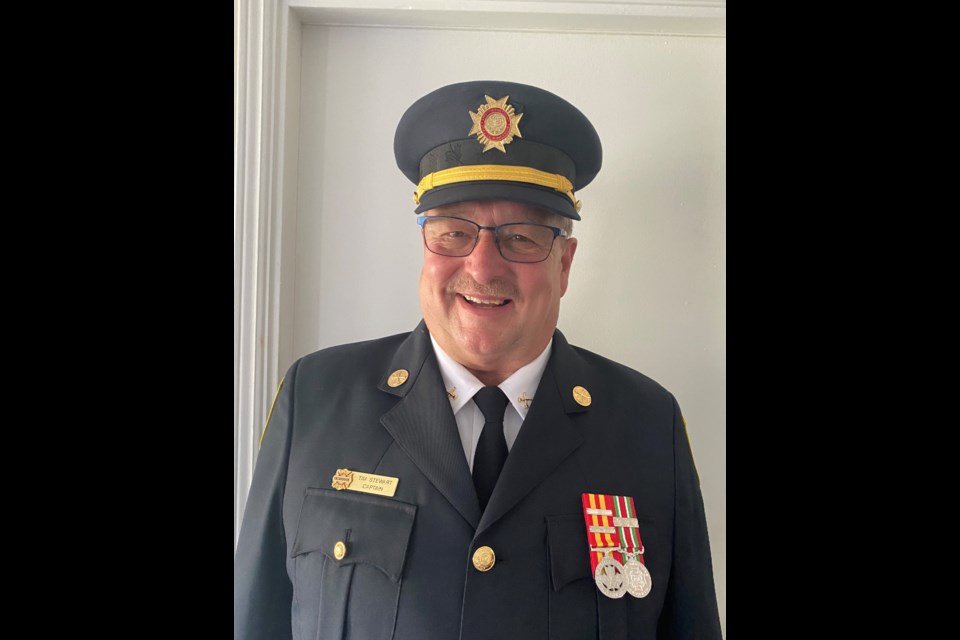Penetanguishene Fire Department (PFD) Captain Tim Stewart recalls hanging off the fire truck wearing wool mittens to a fire.
Throughout his 44-year career, Stewart has seen "tremendous change" in equipment and technology but says the "brotherhood" of firefighters has remained the same.
"When I started, I was the young kid on the department ... I ended up as the old guy," said Stewart, 65.
With 44 years of service, Stewart is the longest serving firefighter in the department's history.
He's also a third-generation volunteer firefighter for Penetanguishene.
His father Robert (Bob) was on the department for 32 years. He was the fire chief until his death in 1979.
His grandfather, Jack Stewart, was a firefighter but Tim doesn't know his number of years of service. Ironically, there was a fire in the late 1950s at the Robert Street West building and all the department records were destroyed.
The same year his father died, Tim joined the department, having visited the fire hall many times with him.
When Tim Stewart started in 1979, firefighters were given a petch coat (a long rain coat made of canvas), over-the-knee rubber boots and a helmet. Firefighters wore whatever pants they showed up in and were given nothing for their hands.
"What we had for hand protection was wool mitts. A lady in Penetanguishene would knit the mitts. The first thing you would do is get them wet. It would give you some protection from the heat and allow you to grip things," said Stewart.
When the department finally got bunker gear, it was a huge improvement, he explained. It was a shorter coat, a full pair of pants and short rubber boots. The gear contains Nomex, flame resistant material.
"You could get much closer to the fire and we were better able to fight the fire and put it out."
When Stewart started, the department had four sets of self-contained breathing apparatus, which everyone shared. Now every person has their own mask to go with the breathing apparatus and 18 breathing apparatus units in total. The current sets each have a thermal imaging camera.
"It's incredible the technology that's in the new gear compared to 40 years ago."
The first aerial truck/pumper arrived in 1981 with a 75-foot ladder on it. That truck served the town until 2010, said Stewart. It was replaced with the current aerial truck/pumper that is equipped with a 95-foot ladder.
Safety procedures are a lot heartier today as well, he noted.
"When I started we still had guys that rode on the back end of the truck like you see on the movies," said Stewart.
Today, all the trucks have space inside the cab for six firefighters.
When Stewart started the total crew with chief and deputy was 20. Now they are up to 30 including a couple of female firefighters.
"It is a brotherhood. You are working with these people in dangerous situations. Everybody has to trust to each other. The key to that is training, training, training."
Stewart became a captain in 1983. He pushed for more training protocols and conducted lots of training. He believes he is "leaving the town of Penetanguishene in a good position."
Training should be ongoing, independent of your years of service, he said.
"Technology changes, equipment changes. New things are coming."
In addition, today's building construction uses so many different materials and furniture today is so much more flammable, meaning firefighters are exposed to more contaminated gasses, he explained.
One of the first fires Stewart remembers fighting was a train wreck in Oro-Medonte in 1980 or 1981. All the area fire departments were called into fight the big train derailment outside of Coldwater.
"That was a big one," said Stewart. "It wasn't a big fire but it was a huge scene to haul the cars out and put them back on the rail."
Another one was the old Grew Manufacturing compound on the Penetanguishene waterfront on land which is now Bayside Estates. Grew also owned the land across the road, which is now Bayfield House Retirement Lodge.
"That fire started at 10 or 11 at night. We were there on or off for the better part of a week before that was put out," said Stewart, noting fire crews from Midland joined in the fight.
The compound manufactured fibreglass boats. The fire closed them permanently, said Stewart, who couldn't remember the year of the fire.
Stewart was also part of the team of firefighters who fought a big fire at Town of Penetanguishene's public works building on Dufferin Street in the mid to late 1980s. All the heavy equipment, including snow plows, were destroyed.
Despite the hardships of the job, Stewart said he wouldn't change it.
"It's a very rewarding part-time career. I think it was awesome. I met a lot of people," said Stewart.
The PFD is only as good as its chief and officers, said Stewart.
"We've been fortunate to have awesome people, doing their job properly."
Stewart's last day on the job was Aug. 30. He now plans to travel with his wife and spend more time with his three children and five grandchildren. The couple are travelling to Costa Rica for a month.
"We are certainly looking forward to it."



